Brandeis professor to speak at B’nai Jehudah
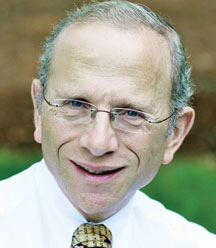 If American Jewish history’s your thing, The Temple, Congregation B’nai Jehudah has it covered with their November scholar in residence weekend featuring Jonathan Sarna, Ph.D.
If American Jewish history’s your thing, The Temple, Congregation B’nai Jehudah has it covered with their November scholar in residence weekend featuring Jonathan Sarna, Ph.D.
Sarna, a professor of American Jewish history at Brandeis University, is well known for his books, especially “American Judaism: A History” and “When General Grant Expelled the Jews.” He is also the chief historian of the National Museum of American Jewish History.
“I think it’s really important to bring (scholars) to the Midwest,” said Mary Davidson Cohen, who is sponsoring the weekend. “We have a proud heritage, and that heritage is not just in Europe.”
He’ll focus on American Jewish history during his sermon at the Friday night service Nov. 16.
“What’s really significant is that I’m going to be talking about General Order 11 and the whole history of Jews in the Civil War,” Sarna said. “This is the 150th anniversary of the order in which Ulysses S. Grant expelled Jews from his war zone, the most notorious official act of anti-Semitism in American history, the only time Jews as a class were expelled from anywhere in the United States. Many people don’t know about it.”
Sarna said that after President Abraham Lincoln overturned the expulsion order, Grant apologized and when he was president later on, he appointed more Jews to government positions than anyone else had and went out of his way to be sensitive to Jews.
The other main topic he’ll talk about, mostly during his Saturday lunch and learn session is a letter from George Washington to the Jews of Newport, R.I.
The letter, which Sarna said champions “no sanction for persecution and insists that it’s not just toleration that will (create) religious liberty in the United States. It’s an inherent natural right.”
Sarna will tie that letter into a discussion of how Judaism developed in the early years of this country.
“I don’t think most American Jews have had the opportunity to learn a lot about their history,” Sarna said. “My sense is that many people don’t realize the extent to which Jews were a part of America’s history from the colonial period onward and what the central aspects of that history are and why that’s important.”
According to Sarna, both Washington’s letter and Grant’s order are important to consider when one examines the growth of American Judaism.
“George Washington’s letter helps shape a certain kind of America in terms of the religious character he helped to define. Similarly, General Order 11 was a central issue in the 1868 election when Grant ran for president,” Sarna said.
As a first generation American, Sarna said his interest in history was natural.
“Someone once claimed I went into the one field my father, who was a famous scholar, knew nothing about. But I’ve really been interested in American Jewish history going on 40 years,” he said. “It’s about how Jewish history in the United States was intertwined with the history of the country as a whole … Jews have a played a significant role at different moments in American history, a role that members of the Jewish community should know about (and) anyone (studying) American history should know about.”
Sarna said he’s excited to be speaking at B’nai Jehudah, as he has admired the book local author Frank Adler wrote about the synagogue’s history, which he called “one of the finest synagogue histories we have.”
“Anyone who really wants to understand the history of the synagogue can read his volume, which is based on really fabulous research,” Sarna said. “He understands the significance of the history of the congregation for understanding the history of American Judaism in general.”
Professor Sarna’s schedule of events
Jonathan Sarna will be speaking throughout the weekend of Nov. 16-17 at The Temple, Congregation B’nai Jehudah. Events include:
Friday, Nov. 16, 6 p.m. Sarna will give the sermon at Erev Shabbat Services.
Saturday, Nov. 17, 10:30 a.m. to 12 p.m. Morning service with a d’var Torah from Sarna. He will speak again at a Kiddush lunch and study session after worship.
Those wishing to attend the lunch and learn, which is free, should call 913-663-4050 to reserve a spot.



 The religious rights of women in Israel may have just recently come to the surface of public opinion here in the United States. But women’s rights have long been one of the focuses of acclaimed artist Andi Arnovitz’s work. Arnovitz, who was born in Kansas City and moved to Israel in 1999, spent some time in the area late this summer visiting her parents, Sylvia and Marshall LaVine, and discussing her art.
The religious rights of women in Israel may have just recently come to the surface of public opinion here in the United States. But women’s rights have long been one of the focuses of acclaimed artist Andi Arnovitz’s work. Arnovitz, who was born in Kansas City and moved to Israel in 1999, spent some time in the area late this summer visiting her parents, Sylvia and Marshall LaVine, and discussing her art.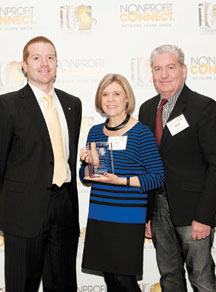 Midwest Center for Holocaust Education was honored Oct. 22 by Nonprofit Connect for its book, “Collective Voices.” Nonprofit Connect links the nonprofit community to education, resources and networking so organizations can more effectively achieve their missions.
Midwest Center for Holocaust Education was honored Oct. 22 by Nonprofit Connect for its book, “Collective Voices.” Nonprofit Connect links the nonprofit community to education, resources and networking so organizations can more effectively achieve their missions. After Hurricane Sandy, a storm of unprecedented magnitude, struck the eastern portion of the United States, the Jewish community and the Jewish Federation movement quickly took action to help with recovery and rebuilding on the East Coast.
After Hurricane Sandy, a storm of unprecedented magnitude, struck the eastern portion of the United States, the Jewish community and the Jewish Federation movement quickly took action to help with recovery and rebuilding on the East Coast. Award-winning author Rita Roth, Ph.D., has just published a new book, “414 Pine Street.” It is available in both print and Kindle editions on amazon.com.
Award-winning author Rita Roth, Ph.D., has just published a new book, “414 Pine Street.” It is available in both print and Kindle editions on amazon.com.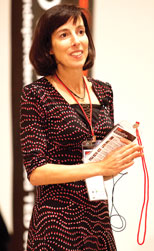 TEDx ENERGIZES COMMUNITY — The license holder for TEDx in Overland Park is a Jewish woman, Sherri Jacobs. Jacobs, an art therapist by trade, said the independent events are part of a global movement devoted to bringing “Ideas Worth Spreading” to communities around the globe. The widely popular events are meant to inspire conversation, prompt innovation and create connections in the areas of technology, entertainment and design. All the speeches are recorded and placed on the TEDx website, www.ted.com. The Oct. 17 event featured Jay Lewis, KU Hillel’s executive director, as emcee and Alana Muller as one of the five featured speakers. Several members of the steering committee are also Jewish: Kristin Schultz, Celeste Aronoff, David Horesh, and Lainie Decker.
TEDx ENERGIZES COMMUNITY — The license holder for TEDx in Overland Park is a Jewish woman, Sherri Jacobs. Jacobs, an art therapist by trade, said the independent events are part of a global movement devoted to bringing “Ideas Worth Spreading” to communities around the globe. The widely popular events are meant to inspire conversation, prompt innovation and create connections in the areas of technology, entertainment and design. All the speeches are recorded and placed on the TEDx website, www.ted.com. The Oct. 17 event featured Jay Lewis, KU Hillel’s executive director, as emcee and Alana Muller as one of the five featured speakers. Several members of the steering committee are also Jewish: Kristin Schultz, Celeste Aronoff, David Horesh, and Lainie Decker.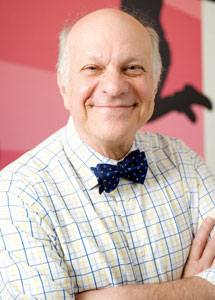 After 35 years as a pediatrician in Kansas City, Dr. Michael Blum is hanging up his stethoscope.
After 35 years as a pediatrician in Kansas City, Dr. Michael Blum is hanging up his stethoscope.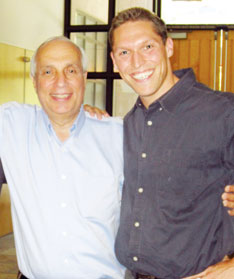 Rabbi Avraham (Avi) Weiss, the founder and president of Yeshivat Chovevei Torah Rabbinical School and senior rabbi of the Hebrew Institute of Riverdale (New York), will be Kehilath Israel Synagogue’s scholar in residence the weekend of Nov. 9. This is the first weekend of the new Caviar Family Jewish Scholar in Residence Series.
Rabbi Avraham (Avi) Weiss, the founder and president of Yeshivat Chovevei Torah Rabbinical School and senior rabbi of the Hebrew Institute of Riverdale (New York), will be Kehilath Israel Synagogue’s scholar in residence the weekend of Nov. 9. This is the first weekend of the new Caviar Family Jewish Scholar in Residence Series.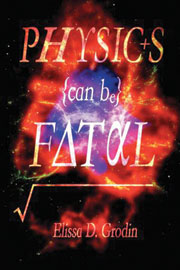 “Physics Can Be Fatal,” by Elissa D. Grodin, Cozy Cat Press, available on amazon.com and barnesandnoble.com in paperback, Kindle and Nook
“Physics Can Be Fatal,” by Elissa D. Grodin, Cozy Cat Press, available on amazon.com and barnesandnoble.com in paperback, Kindle and Nook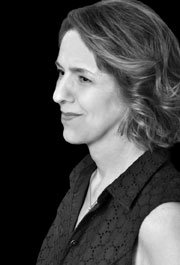 For her first adult novel, she chose mystery because she loves the genre and believes it is underrated.
For her first adult novel, she chose mystery because she loves the genre and believes it is underrated.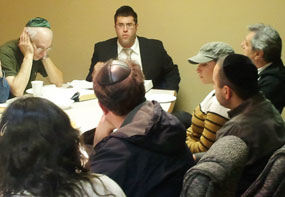 KOLLEL GETS ITS OWN PLACE — The Community Kollel of Kansas City was formed in 2007 and up until now the group of rabbis — now consisting of Rosh Kollel Rabbi Yehuda Sokoloff, Rabbi Binyomin Davis, Rabbi Elchanan Schulgasser and Rabbi Avi Feigenbaum — wandered throughout the Jewish Community Campus. The organization held classes at the Campus and studied and had office space at the Hyman Brand Hebrew Academy. But now the Kollel has a home of its own. Its new office suite is located at 6400 W. 110th Street, Suite 204, very near the Overland Park Convention Center. The Kollel rabbis are now studying in their own beit midrash, which is home to one of the best Talmudic libraries in the Midwest thanks to a gift from Aaron Robinow. Weekly classes will now take place in the conference room at the new Kollel center. To see a complete schedule of Kollel classes, visit www.kckollel.org.
KOLLEL GETS ITS OWN PLACE — The Community Kollel of Kansas City was formed in 2007 and up until now the group of rabbis — now consisting of Rosh Kollel Rabbi Yehuda Sokoloff, Rabbi Binyomin Davis, Rabbi Elchanan Schulgasser and Rabbi Avi Feigenbaum — wandered throughout the Jewish Community Campus. The organization held classes at the Campus and studied and had office space at the Hyman Brand Hebrew Academy. But now the Kollel has a home of its own. Its new office suite is located at 6400 W. 110th Street, Suite 204, very near the Overland Park Convention Center. The Kollel rabbis are now studying in their own beit midrash, which is home to one of the best Talmudic libraries in the Midwest thanks to a gift from Aaron Robinow. Weekly classes will now take place in the conference room at the new Kollel center. To see a complete schedule of Kollel classes, visit www.kckollel.org.